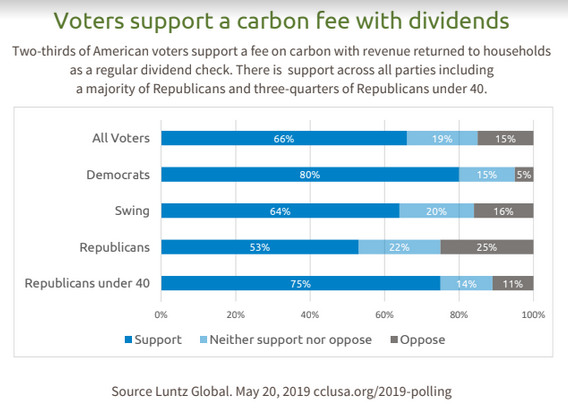
Carbon Pricing Facts
Climate change requires urgent, effective action
Atmospheric carbon dioxide concentrations continue to rise (it reached 420PPM recently) and global warming is creating havoc across the planet. The consequences are impossible to ignore and will only worsen. The latest IPCC report reinforces the need for action and reminds us about what is at stake. When it comes to action the IPCC report says: “Pricing of greenhouse gases, including carbon, is a crucial tool in any cost-effective climate change mitigation strategy, as it provides a mechanism for linking climate action to economic development.” For more on what the latest IPCC says about carbon pricing, please click this link.
Carbon pricing policy works in the real world
Courtesy of Felipe Souza
British Columbia implemented their carbon tax in 2008, and it is currently at $45/ton. Studies have shown that it had a minimal impact on their economy while reducing emissions between 5 and 15%.
Sweden implemented a carbon tax in 1991 and has the highest price globally at $137/ton. It reduced its emissions by 25% by 2000. At the same time, its economy grew by 60%.
Carbon pricing will encourage investment and innovation in clean energy solutions. The EU’s carbon price has been cited as one of the main reasons electric vehicle penetration in Europe far exceeds that of the US (Climate Now podcast 2/25/2022). Furthermore, Metcalf and Stock find that the EU’s carbon price has a very negligible impact on its overall economy.
Carbon pricing is popular
Placing a price on carbon pollution has been endorsed by thousands of economists, former Chairs of the Federal Reserve, the US Chamber of Commerce and Business Roundtable, prominent religious groups, Pope Francis, and many prominent individuals and businesses.
Hawaii’s leaders endorse national carbon legislation. In the current Congress, Senator Brian Schatz has introduced Save Our Future Act (a carbon pricing bill) and Representative Kai Kahele co-sponsored a prominent carbon pricing bill, HR2307.
For Hawaii, the Yale Program on Climate Change Communication 2021 finds that 66% of those surveyed favor requiring fossil fuel companies pay a carbon tax. (Fact sheet)
Nationwide, the Luntz Global group (2019) finds wide support nationally for carbon cashback.
International organizations view carbon pricing as essential to reducing global emissions.
A recent IPPC reports says: "There are several advantages for environmental taxation including environmental effectiveness, economic efficiency, the ability to raise public revenue, and transparency (very high confidence). These gains can provide more resource-efficient production technologies and positively affect economic competitiveness (Costantini et al., 2018)"
“IMF staff proposes an international carbon price floor arrangement to complement the Paris Agreement and spur collective action.”






